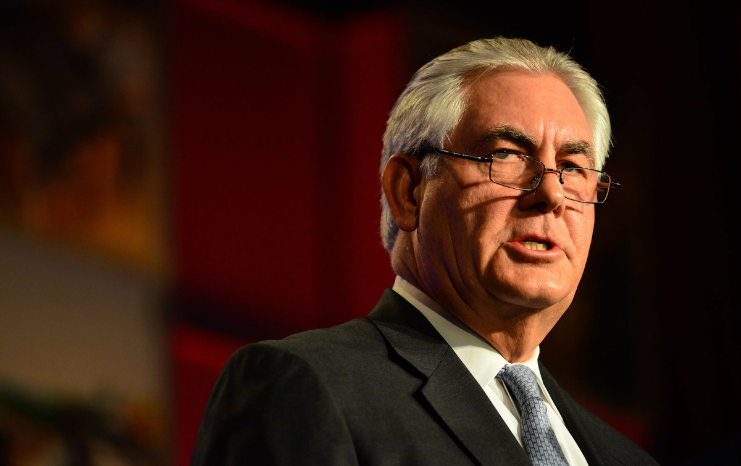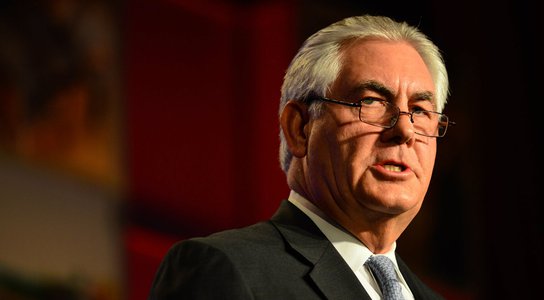
Today marks six months of former ExxonMobil CEO Rex Tillerson’s tenure as US Secretary of State – the person leading America’s foreign policy. So how well is he performing in his new job? 181 days in, there’s more cause for alarm than praise.
When Tillerson’s nomination was announced we expressed serious concerns about his ability to protect national security and act in the public interest, given his track record at the helm of ExxonMobil. These concerns stemmed from our extensive experience investigating corruption around the world, showing that ExxonMobil and its predecessors repeatedly engaged in questionable oil deals and transactions, including with corruption-plagued governments of Equatorial Guinea, Nigeria, Kazakhstan, Angola and Chad. USA Today further reported that ExxonMobil did business with Iran, Syria and Sudan through a European subsidiary while those countries were subject to US anti-terrorism sanctions.
We also joined other environmental groups in challenging Tillerson’s fitness to serve as the top US climate dealmaker in light of ongoing investigations into ExxonMobil intentionally misleading its investors and the public on climate change science.
Has Tillerson surprised us and proven us wrong? If only. The past few months have seen an unprecedented rollback of key anti-corruption, climate and environmental measures at the behest of the fossil fuel industry.
To start with, the very first act of law by the new Congress and President was to undo a key transparency regulation requiring US gas and oil companies to disclose payments they make to governments around the world. This decision was a huge gift to big oil, who ardently opposed the regulation. Tillerson himself had personally lobbied US Congress against this law. Without this payment transparency, it’s even more difficult to ensure oil deals pursued by Exxon and other major oil companies are free from corruption. Even Exxon’s competitors, like Russian state-owned oil companies Gazprom and Rosneft, report this information in other countries.
Moreover, US participation in an important global extractive transparency program, Extractive Industries Transparency Initiative (EITI) is now on life support, in large part due to the failure of companies like Exxon and Chevron to declare their US tax payments. This theme of tax secrecy is a familiar one – just look at President Trump: he broke a long-standing practice of presidential candidates disclosing their tax returns to keep his hidden. Tillerson similarly refused to provide his tax returns as part of his confirmation process. Lack of transparency in the Trump administration doesn’t stop there – much like the White House, Tillerson’s State Department has broken with the practices of holding regular daily press briefings and traveling with a press pool on official state visits. While secrecy and press aversion might have been the norm in Tillerson’s corporate context, it is unacceptable to carry these habits over into high-profile public service.
When it comes to conflicts of interest, matters ought to be clear, as federal ethics rules require Tillerson to fully divest and recuse himself from any matters directly involving his former company for one year, and he has pledged to comply. But it appears that Tillerson is not complying willingly: he didn’t recuse himself from the State Department Keystone pipeline decision until he came under pressure from Greenpeace. Tillerson attending a signing ceremony for a major ExxonMobil deal in Saudi Arabia during an official state visit also raised questions about Tillerson’s compliance with relevant ethics rules (unsurprisingly, US press weren’t allowed there either).
A major area where Tillerson’s loyalties have come into question is Russia, where he previously led Exxon in making deals with state oil giant Rosneft. Most of these deals are on hold as a result of US sanctions against Rosneft and its boss Igor Sechin, a personal friend of Tillerson’s. Last week ExxonMobil was fined US$2 million by the Treasury Department for Russia sanctions violations while Tillerson was the CEO. At the same time, the company is lobbying hard against the latest Congressional attempt to toughen those sanctions, something that Tillerson also opposes.
Of course, ethical problems are not limited to Rex Tillerson; they pervade the entire Trump administration. The Sunlight Foundation’s review of the first six months of the Trump administration concluded that this is “a secretive administration, allergic to transparency, ethically compromised.” But no one personifies these themes and the takeover of the US government by fossil fuel industry interests better than Secretary of State Rex Tillerson. Rex’s report card from diplomacy school would state “Rex shows plenty of room for improvement. He needs to work on his science knowledge, make new friends, and stop hanging about with the rough boys”.


